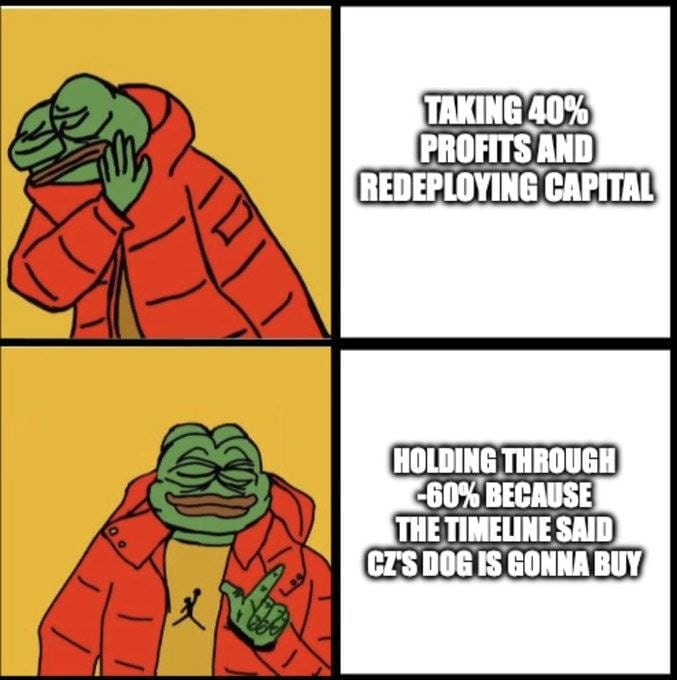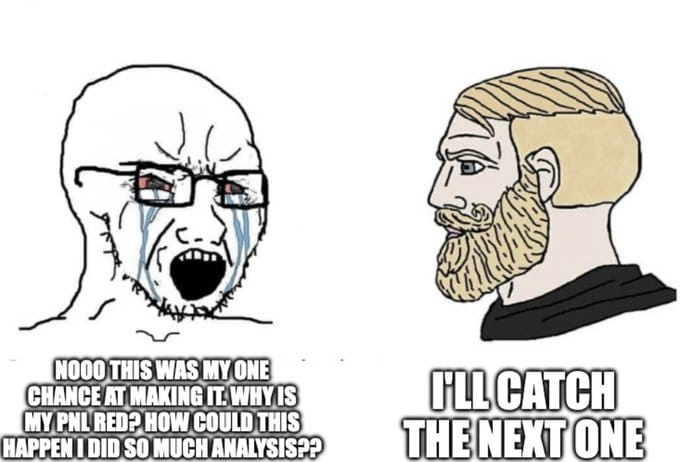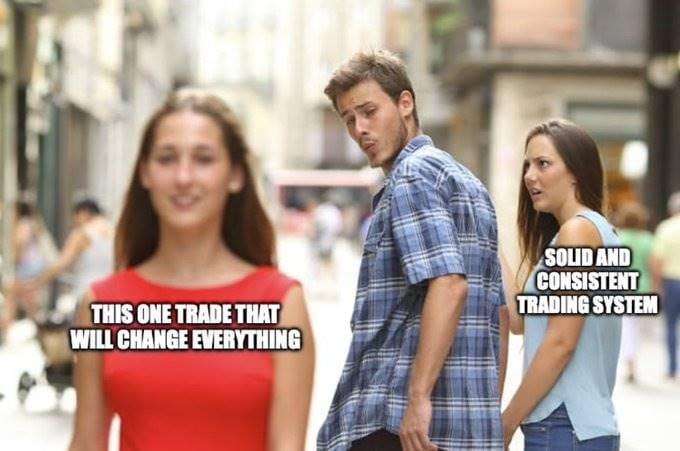Author: VKTR
Compiled by: Shenchao TechFlow
This is not financial advice.
I've held an ETH position for almost two years, basically break-even. It's like dead money, no movement. Like a zombie, it stays in my portfolio while other stocks in the market race past me.

Cursed charts
Now it finally shows some good profits, but that doesn't change the fact that it may be one of the worst trades of my life. The reason isn't the entry point or investment idea, but because I couldn't let go of this trade and redeploy the funds to something more valuable.
This is the manifestation of scarcity mindset. I was too afraid to "let go," preferring to watch my money sit idle for two years rather than admit I was wrong and seek better opportunities.
This phenomenon is everywhere. Traders self-destruct not because they can't read charts or time entries, but because they can't make clear decisions about their capital.
I know a trader who made $2 million in the bull market of 2021. By 2022, he lost it all. Another trader panic-sold all his assets when the market first dropped by 30%, only to watch prices rise 50 times while he continued to hold stablecoins. The same psychological setup, different disasters.
Observe any trader over the long term, and you'll notice the same pattern. They make a killing, then self-destruct because they don't trust their decisions. A 40% surge turns into a 20% loss because they held too long. A 10x runner gets sold at break-even because they don't believe it will continue to rise. A trader who sells a junk coin to zero will eventually panic-sell the next runner due to the philosophy of "a bird in the hand is worth two in the bush."
I've experienced both situations. Not the diamond hands nonsense, nor the panic of the paper hands, but I've seen enough good opportunities turn into regrets to recognize the true patterns. Sometimes I hold too long, sometimes I sell too early. The common thread is not my strategy or analysis.
That is fear.
It's not belief, it's not discipline, it's not about trusting the tech.
While it sounds a bit daunting, this may be childhood trauma.
Invisible cage
I believe most trading mistakes are actually due to a scarcity of capital. Every tweet about "holding through the pain" and every chat message about "I sold too early" indicates that someone has believed since childhood that such opportunities will not come again. Every trader who cannot make clear decisions usually understands early that money is scarce and precious, and it is best not to waste the limited opportunities.
Most traders I know grew up with middle-class anxiety, checking their accounts before making purchases. Parents would argue over bills. Every dollar was precious because it might never come back.
This bullshit follows you into trading like a curse.
Imagine this: you make a 40% profit on a trade. Your scarcity mindset starts calculating. "If I hold a little longer, this money could change your life." So you continue to hold. Holding on and watching your gains evaporate because you can't accept that a 40% profit is enough.
Or the opposite situation: you achieve a 40% gain, and your scarcity mindset whispers, "Take the money and run. You may never see green again." So you sell, only to watch it rise to 400%, while you sit with cash, blaming yourself for not believing in the setup.

Scarcity thinking chooses financial trauma over financial freedom.
Both reactions stem from the same belief: that opportunities are limited and precious.
Behavioral economists have studied this for decades. When you grow up under financial stress, your brain instinctively thinks every decision could lead to disaster. Your childhood experiences are manipulating your trading account, and they are likely causing you to lose money.
Asymmetry of abundance
Meanwhile, there is another type of trader in these markets. They usually grew up with money, or at least a stable financial situation. They make decisions without concern. They take profits on winning positions, cut losses on losing ones, and adjust their positions appropriately. No emotional attachment, no vicious cycle of "what if...".
They genuinely believe that there will be more opportunities in the future, while many of us do not.
Abundant traders think: "I'll let this winner run and manage my risk appropriately. There will always be another trade." Scarcity traders think: "This might be my only chance to achieve financial freedom, so I’ll either lock it in now or let it go to zero."

One method can create wealth, while another can bring anxiety.
Why everyone makes wrong decisions
The most expensive lie in the cryptocurrency space is not about "diamond hands" or "always profiting," but the idea that every trade has a correct answer.
Really, I think we are just afraid. Afraid of missing out. Afraid of making mistakes. Afraid that if we take one wrong step, there will never be another opportunity like it.
This phenomenon is everywhere. Those traders you might call "maximizers" struggle to make clear decisions because every trade could change everything. They hold onto winning stocks for too long, which eventually turn into losing stocks. They sell winning stocks too early, only to watch them go to ruin. They continuously increase their positions without managing risk. They treat every decision as irreplaceable.
They trade their childhood trauma, not the market.
The true cost of narrow-mindedness
Scarcity mindset affects not only your trading but your entire relationship with money and opportunity.
I once made 5 times on a position but couldn't bring myself to lock in profits. I watched it slide down over three months, eventually leaving me with break-even because I was haunted by the fear of "selling too early." But I have also panic-sold winning stocks when they were up 30%, only to see them rise 10 times because my brain couldn't believe I deserved that wealth.

Scarcity thinking leads to specific types of self-destruction:
Decision paralysis—you can't decide when to buy, sell, or hold because every choice feels like it could ruin everything. You feel stuck and can't dynamically manage risk.
Binary thinking—you think every trade is either "diamond hands forever" or "take profits immediately." You can't add or reduce positions because you don't believe you can make multiple correct decisions.
Risk distortion—you either go all-in on a trade or take no meaningful risk. You can't find the middle ground for truly building wealth.
The secret to abundance
The solution doesn't necessarily have to be therapy or meditation, although I find the latter truly helpful. The key is to get your brain to believe that money is a renewable resource, not a finite one.
Ask yourself: "What would someone with $10 million do in this situation?" I can guarantee they wouldn't hold onto stocks until they drop 80% because they "believe in the tech." But they also wouldn't sell in the first 20% of a bull market due to fear of volatility.
Experienced large fund traders do not get emotional about individual trades. They consider risk management and position size, not absolute profits. They prefer to make consistent decisions rather than chase perfect decisions.
Truly effective methods
I wish someone had told me these things five years ago, and the truly successful traders I’ve seen do the same:
Consider various scenarios rather than absolutes. Set multiple profit targets and risk levels before trading. Don't let scarcity thinking convince you there is only one right way to do things.
Measure your position sizes as if you are already wealthy. If you had $1 million, would you bet 100% of the risk on one altcoin? Then why are you doing it with your $10,000 account?
Practice dynamic risk management. Take profits when they are big. Add to positions when you are right. Cut losses when you are wrong. Don't treat every decision as permanent.
Calculate the opportunity cost. Every dollar tied up in a bad trade means you have lost the chance to profit elsewhere. Every dollar you panic-sell means you could have realized compound growth.
Compound effect
Abundance mindset can help you make more money than scarcity mindset. Desperately pursuing perfection in every trade often leads to a reduction in good trades overall.
When you start thinking fully, you make better decisions. You take profits at the right time. You let some winners run. You cut losses. You wait for good opportunities. You stop revenge trading. You stop getting caught up in the narrative of missing out.
All these small decisions accumulate. You will no longer get caught up in the boom-and-bust cycle of scarcity trading, but start to build stable, sustained wealth.
The market rewards patience, discipline, and strategic thinking; it punishes desperation, greed, and emotional decisions. Your mindset determines which category you belong to.
Break the cycle
I still struggle with this. Even now, with a larger account and more experience, I sometimes find myself making decisions out of fear rather than rationality. Scarcity thinking runs deep.
But I have learned to recognize it. And I see the same pattern in every trader who has gone from continuous losses to continuous profits.
The first step is to recognize that your scarcity trap exists. It's not your fault—it's shaped by your childhood experiences with money. But it is your responsibility to change it.
Heal and win
Your relationship with money was formed before you learned to walk, and every trade you make can potentially cause you to lose money. The scarcity trap is a poverty mindset disguised as strategy.
I’ve suffered a lot to understand this. I've lost more money making terrible decisions than when making logical decisions. I’ve turned winners into losers more often due to overthinking than when I follow my plan.
I believe this pattern destroys traders more than any bad technical analysis or market crash.
Your childhood experiences do not determine your trading fate. But you must recognize that your scarcity mindset is the real enemy. Not the market, not whales, and not manipulation.
Your brain breaks down, causing you to continue breaking down.
First, solve this problem. Everything else is just strategy.

